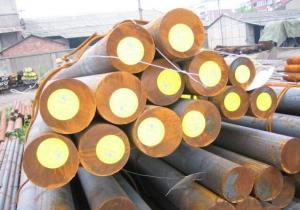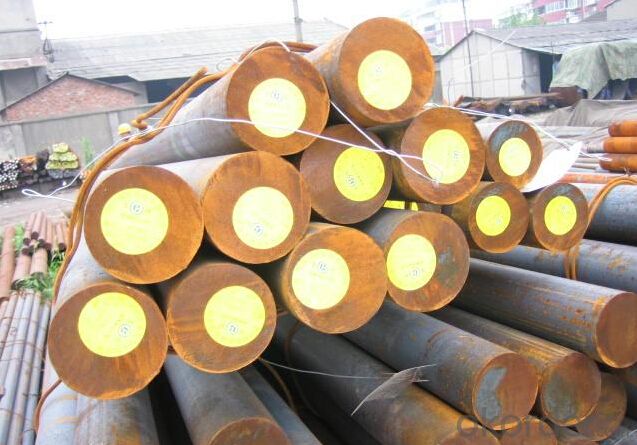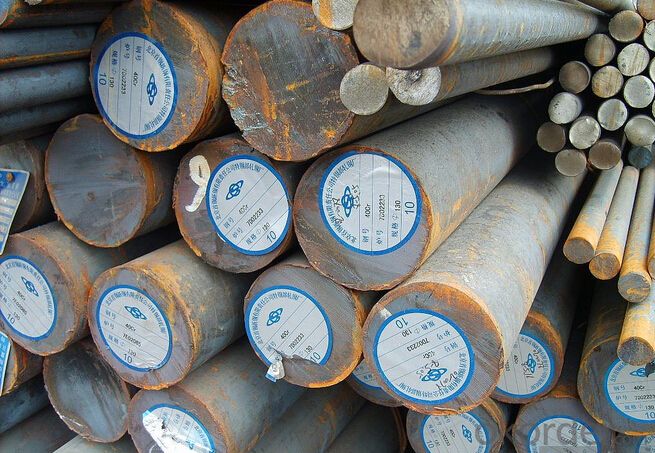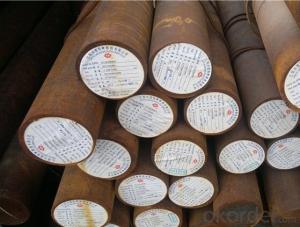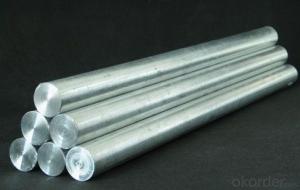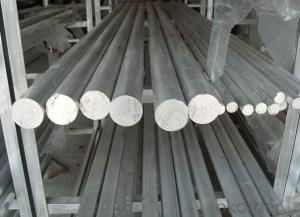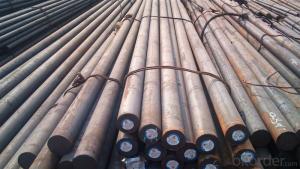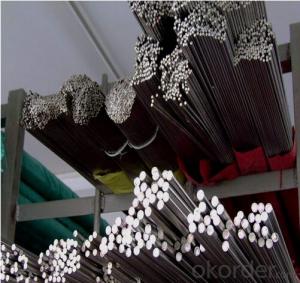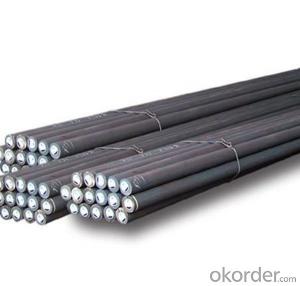5CrNiMoV Tool Steel Special Steel Carbon Steel
- Loading Port:
- China main port
- Payment Terms:
- TT OR LC
- Min Order Qty:
- 25 m.t.
- Supply Capability:
- 10000 m.t./month
OKorder Service Pledge
OKorder Financial Service
You Might Also Like
Specification
Chemical Composition%(GB)
| C | Si | Mn | Ni | Cr | Mo |
| 0.49-0.54 | 0.2-0.3 | 0.95-1.05 | 1.95-2.10 | 0.95-1.10 | 0.45-0.55 |
Characterstics
| 1.High toughness and strength | |||||||
| 2.Higher abrasion resistance | |||||||
| 3.Remaining hardness of HB300 at 500℃ | |||||||
| 4.Insensitive to tempering brittleness due to addition of Mo |
Applications: Suitable for large and medium sized forging dies with thickness of 250-350mm for automobiles,tractors,transmission gears,front axle beams and rear axles of automobiles,and forging dies for engineering machine components


1, Your advantages?
professional products inquiry, products knowledge train (for agents), smooth goods delivery, excellent customer solution proposale
2, Test & Certificate?
SGS test is available, customer inspection before shipping is welcome, third party inspection is no problem
3, Payment Terms?
30% TT as deposit and 70% before delivery.
Irrevocable L/C at sight.
4, Trading Terms?
EXW, FOB, CIF, FFR, CNF
6, After-sale Service?
We provides the services and support you need for every step of our cooperation. We're the business partner you can trust.
For any problem, please kindly contact us at any your convenient time.
We'll reply you in our first priority within 24 hours.
- Q: What are the different forming processes for special steel?
- There are several forming processes for special steel, including hot forming, cold forming, and powder metallurgy. Hot forming involves heating the steel to a high temperature and then shaping it through processes like forging or rolling. Cold forming, on the other hand, involves shaping the steel at room temperature using processes like bending or extrusion. Powder metallurgy involves compacting metal powders and then sintering them to create a solid piece. These forming processes allow for the production of special steel with unique properties and shapes to meet various industrial needs.
- Q: How does special steel contribute to the manufacturing of medical implants?
- Special steel plays a crucial role in the manufacturing of medical implants due to its unique properties and characteristics. Medical implants require materials that are biocompatible, corrosion-resistant, and durable. Special steels, such as stainless steel, titanium alloys, and cobalt-chromium alloys, possess these desired qualities, making them ideal for medical implant production. Firstly, stainless steel is widely used in the manufacturing of medical implants due to its excellent corrosion resistance and high strength. It is often employed in applications like surgical instruments, orthopedic implants, and dental devices. Stainless steel implants can withstand the harsh physiological environment within the body, ensuring long-term performance and reducing the risk of complications. Titanium alloys are another type of special steel extensively used in medical implant manufacturing. These alloys offer high strength-to-weight ratio, exceptional biocompatibility, and resistance to corrosion. Titanium implants are commonly used in orthopedic surgeries, such as joint replacements, as well as dental implants. The biocompatible nature of titanium allows for better integration with the surrounding bone, promoting faster healing and reducing the risk of rejection. Cobalt-chromium alloys are yet another type of special steel utilized in the production of medical implants. These alloys possess excellent mechanical strength, wear resistance, and biocompatibility. Cobalt-chromium implants are frequently employed in orthopedic surgeries and cardiovascular interventions, such as stents. Their high strength ensures stability and longevity, while their biocompatibility minimizes adverse reactions and promotes patient recovery. Overall, special steel provides the necessary qualities required for manufacturing medical implants. Whether it is stainless steel, titanium alloys, or cobalt-chromium alloys, these materials contribute to the development of biocompatible, corrosion-resistant, and durable implants that improve patients' quality of life and ensure successful medical procedures.
- Q: What are the different corrosion protection techniques used for special steel?
- There are several corrosion protection techniques used for special steel, including: 1. Coatings: Special steel can be coated with a variety of protective materials such as paints, epoxy, or other barrier coatings. These coatings act as a physical barrier between the steel and corrosive elements, preventing direct contact and potential damage. 2. Cathodic protection: This technique involves the use of sacrificial anodes or impressed current systems to protect the steel. Sacrificial anodes, typically made of zinc or aluminum, corrode instead of the steel, sacrificially protecting it. Impressed current systems use an external power source to provide a protective current that prevents corrosion. 3. Galvanization: Special steel can be hot-dip galvanized by immersing it in molten zinc. This creates a protective layer on the surface of the steel, significantly increasing its resistance to corrosion. 4. Alloying: Alloying the special steel with specific elements can enhance its corrosion resistance. For example, adding chromium to the steel can create a passive oxide layer that acts as a protective barrier against corrosion. 5. Passivation: Special steel can undergo passivation, a chemical process that removes free iron and other contaminants from the surface, promoting the formation of a protective oxide layer. Each of these techniques can be tailored to suit the specific requirements of the special steel and its intended application, providing effective corrosion protection and prolonging the lifespan of the material.
- Q: Can special steel be used in the mining industry?
- Yes, special steel can be used in the mining industry. Special steel, such as high-strength and wear-resistant steels, can be utilized for various applications in the mining industry, including the manufacturing of heavy machinery, equipment, and tools used in mining operations. These steels offer superior durability, strength, and resistance to abrasion, making them suitable for the harsh and demanding conditions present in mining environments.
- Q: How does special steel contribute to the longevity of products?
- Special steel contributes to the longevity of products by providing enhanced strength, durability, and resistance to wear and corrosion. Its unique composition and manufacturing processes make it ideal for applications where strength and longevity are crucial, such as in the automotive, aerospace, and construction industries. By using special steel, products can withstand extreme conditions and heavy use over extended periods, ensuring a longer lifespan and reducing the need for frequent replacements.
- Q: What are the applications of special steel in the automotive manufacturing process?
- Special steel is widely used in the automotive manufacturing process for various applications. It is commonly used for making engine components like crankshafts, camshafts, and connecting rods due to its high strength and resistance to wear and heat. Special steel is also used for manufacturing suspension systems, steering components, and chassis parts, as it offers excellent mechanical properties and durability. Additionally, special steel is utilized in the production of safety features such as seatbelt components and airbag systems, ensuring the highest level of protection for occupants. Overall, special steel plays a crucial role in enhancing the performance, reliability, and safety of vehicles in the automotive industry.
- Q: How is special steel used in the production of surgical instruments?
- Special steel is used in the production of surgical instruments due to its unique properties such as corrosion resistance, durability, and ability to maintain sharpness. It ensures that surgical instruments can withstand sterilization processes while maintaining their functionality and longevity. Additionally, the specific composition of special steel allows for precise shaping and fine-tuning, enabling the creation of intricate and precise surgical tools necessary for various medical procedures.
- Q: How does special steel contribute to reducing product weight?
- Special steel contributes to reducing product weight through its unique properties. Special steel is known for its high strength-to-weight ratio, which means it can provide the same level of strength and durability as other materials while being significantly lighter. By using special steel in the manufacturing process, products can be designed with thinner and lighter components without compromising their structural integrity. This reduction in weight not only makes the product more portable and easier to handle, but it also helps in reducing transportation costs and improving fuel efficiency in industries such as automotive and aerospace.
- Q: Can special steel be used in the medical industry?
- Yes, special steel can be used in the medical industry. Special steel alloys, such as stainless steel, are commonly used in medical devices, surgical instruments, and implants due to their excellent corrosion resistance, biocompatibility, and sterilization capabilities. These qualities make special steel a reliable and safe choice for various medical applications.
- Q: What are the main advantages of using special steel in the automotive racing industry?
- The main advantages of using special steel in the automotive racing industry are its high strength-to-weight ratio, excellent durability, and superior heat resistance. Special steel allows for the construction of lightweight yet strong components, enhancing the overall performance and speed of racing cars. Additionally, its exceptional durability ensures that the parts can withstand the extreme forces and vibrations experienced during racing, minimizing the risk of failure. Moreover, special steel's excellent heat resistance prevents deformation or weakening of components, even under high temperatures generated by the intense racing conditions.
Send your message to us
5CrNiMoV Tool Steel Special Steel Carbon Steel
- Loading Port:
- China main port
- Payment Terms:
- TT OR LC
- Min Order Qty:
- 25 m.t.
- Supply Capability:
- 10000 m.t./month
OKorder Service Pledge
OKorder Financial Service
Similar products
Hot products
Hot Searches
Related keywords
